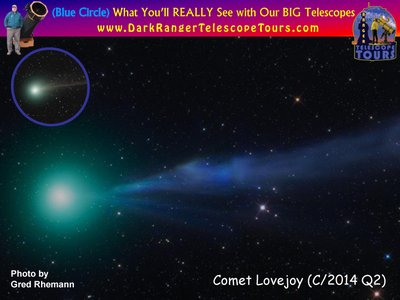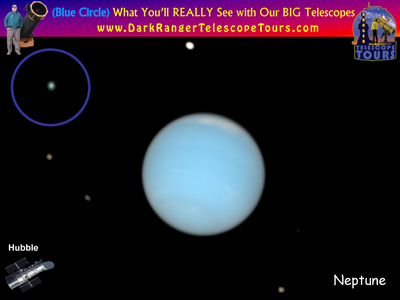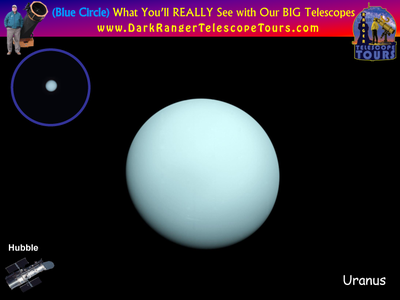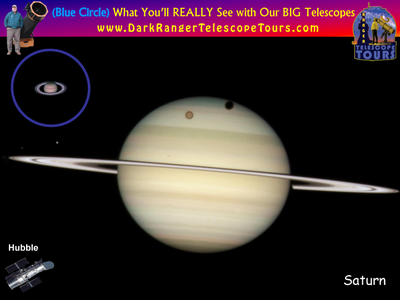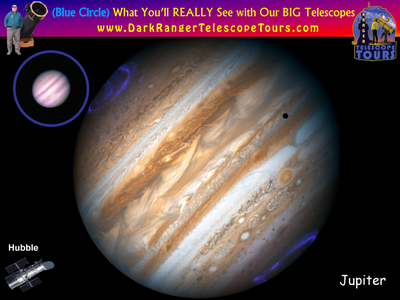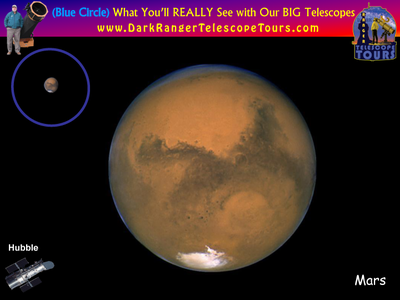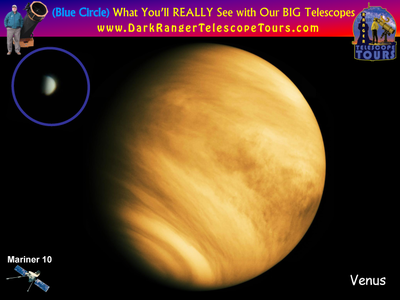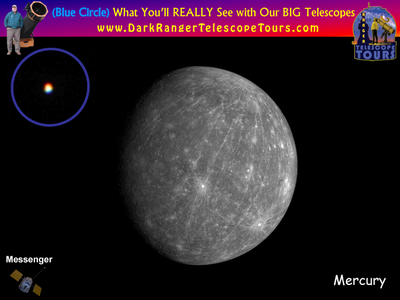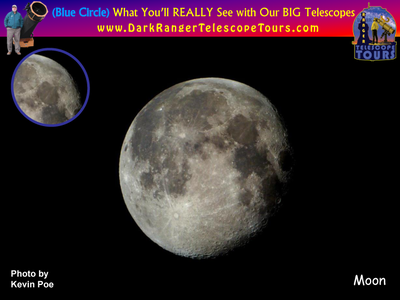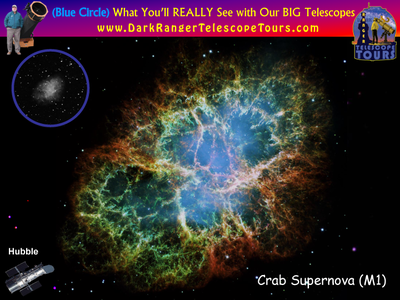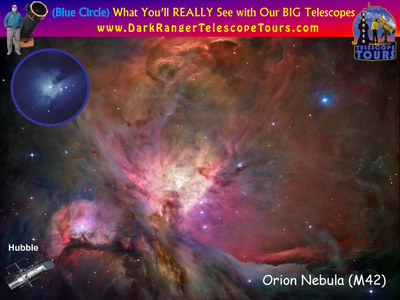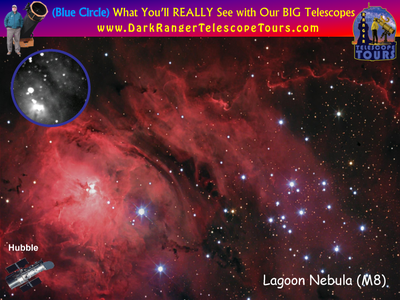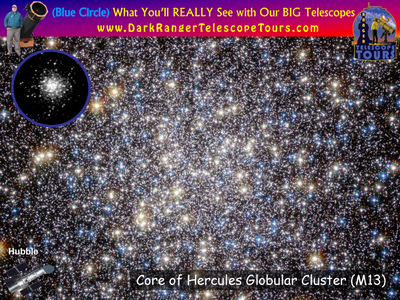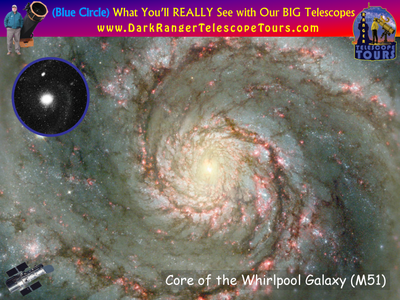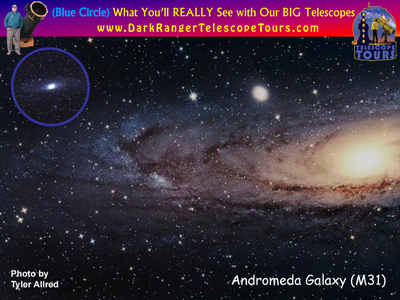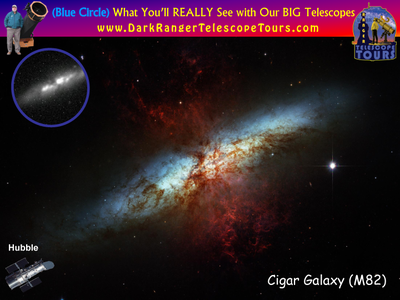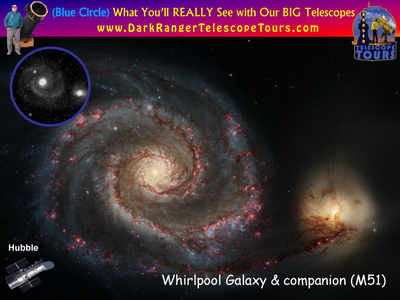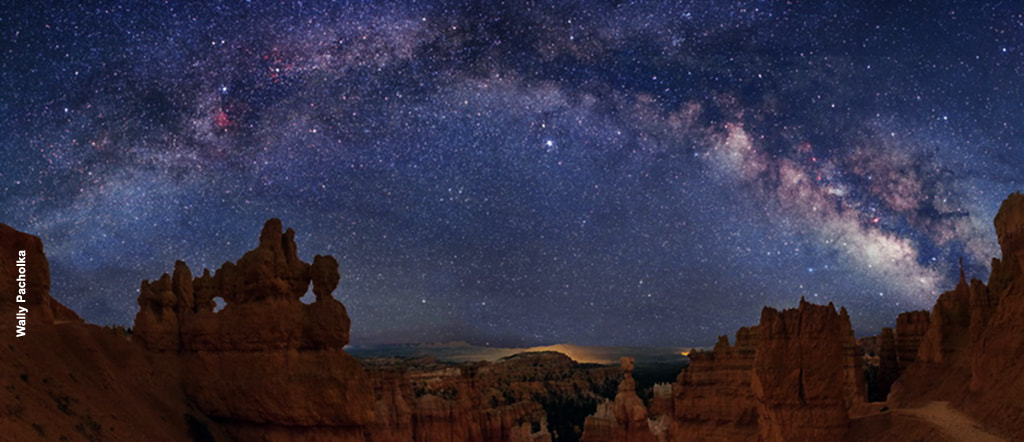"Sure you could tour the universe by web-surfing, but if you want the authentic, you'll want to join us. We are all about the original Photons!" - Richard Blake
What Will I See?
Photography reveals the night sky and astronomical objects in a way that no human eye, regardless of telescope size, can ever see. So instead of building up your hopes, (and ultimately your disappointment) with unrealistic photography of the Universe, we present you with comparative images. In the photo albums below (click on thumbnails for larger images) you'll see Solar System objects, and the deep space objects far beyond our star system in two ways. The large images in each comparison are from astrophotography -- some from orbiting space telescopes others are Dark Rangers who attached professional cameras to our telescopes. The view inside the blue circles are the same objects as the large colorful pictures, except that they simulate the way the human eye will see them through our telescopes.
Our eye-brain system is more like an Etch-a-Sketch than a camera. We can only "draw" each image for a maximum of 1/15 of a second, before or brain deletes that image and draws the next one. That draw and delete design is how we detect motion. In the bright of day we can use a much faster frame-rate 60-120 "draws and deletes" per second and still see detail and color. But in the dark we never get enough time to see much detail or detect color, even when in full night vision mode (15 frames per second). It's no wonder astrophotography reveals far more, those pictures are hours or even week-long exposures, as in the case of the Hubble Space Telescope. Either your optometrist or your Dark Ranger can tell your more about this widely misunderstood difference between eye biology and camera technology -- all you have to do is ask. In the meantime the visual comparisons below will help adjust your expectations and hopefully inspire you to take your preparedness seriously.
Our eye-brain system is more like an Etch-a-Sketch than a camera. We can only "draw" each image for a maximum of 1/15 of a second, before or brain deletes that image and draws the next one. That draw and delete design is how we detect motion. In the bright of day we can use a much faster frame-rate 60-120 "draws and deletes" per second and still see detail and color. But in the dark we never get enough time to see much detail or detect color, even when in full night vision mode (15 frames per second). It's no wonder astrophotography reveals far more, those pictures are hours or even week-long exposures, as in the case of the Hubble Space Telescope. Either your optometrist or your Dark Ranger can tell your more about this widely misunderstood difference between eye biology and camera technology -- all you have to do is ask. In the meantime the visual comparisons below will help adjust your expectations and hopefully inspire you to take your preparedness seriously.
See more by being better prepared...
Results may vary for your actual eye in our telescopes. But what is certain, your views will be worse if:
1. you've ignored telescope focusing instructions your Dark Ranger(s) welcomed you with and reiterated throughout the night
2. you've failed to dress warmly enough so your eyes keep watering to protect themselves from the cold
3. you've consumed too much alcohol and arrived with drunken eyes and drunken listening ability
4. you didn't book a back up night so we didn't have the option of picking the best of 2 or more nights for you to attend.
5. you've arrived from a long day of travel and didn't take a nap so you started stargazing with already exhausted eyes
6. it's been a while since your last eye exam
7. you made the planning trade-off of having booked a bright Moon night.
8. you booked during our late summer monsoon season and against our advice, left early before the sky cleared
9. humidity was too high, or breezes too strong for us to use high-power eyepieces so you got less-magnified, smaller versions than blue circles examples below because the highly magnified views would have been too blurry to see anything. Sometimes smaller IS better!
10. Some objects were not "in season", or as with planets, happen to have "wandered" to the day-side of Earth.
Don't despair by the length of his list! Factors 1 through 8 are entirely within your control.
Sound too daunting? There's always planetariums, on-line videos/TV, or the display screens of tube-shaped digital cameras masquerading as telescopes. Those views are fake photons recreated through photography. We show you the actual starlight, the original photons. That authenticity comes with the trade-off of "results may vary" stargazing improved when you and your eyes are as best prepared as possible -- the version inside the blue circles below.
1. you've ignored telescope focusing instructions your Dark Ranger(s) welcomed you with and reiterated throughout the night
2. you've failed to dress warmly enough so your eyes keep watering to protect themselves from the cold
3. you've consumed too much alcohol and arrived with drunken eyes and drunken listening ability
4. you didn't book a back up night so we didn't have the option of picking the best of 2 or more nights for you to attend.
5. you've arrived from a long day of travel and didn't take a nap so you started stargazing with already exhausted eyes
6. it's been a while since your last eye exam
7. you made the planning trade-off of having booked a bright Moon night.
8. you booked during our late summer monsoon season and against our advice, left early before the sky cleared
9. humidity was too high, or breezes too strong for us to use high-power eyepieces so you got less-magnified, smaller versions than blue circles examples below because the highly magnified views would have been too blurry to see anything. Sometimes smaller IS better!
10. Some objects were not "in season", or as with planets, happen to have "wandered" to the day-side of Earth.
Don't despair by the length of his list! Factors 1 through 8 are entirely within your control.
Sound too daunting? There's always planetariums, on-line videos/TV, or the display screens of tube-shaped digital cameras masquerading as telescopes. Those views are fake photons recreated through photography. We show you the actual starlight, the original photons. That authenticity comes with the trade-off of "results may vary" stargazing improved when you and your eyes are as best prepared as possible -- the version inside the blue circles below.
The Solar System
- not significantly impacted by a bright Moon night
- NOT seasonal, but also realize certain planets are in the sky at different times. Simple explanation is that they have their own orbits and axial tilts to worry about. They can't be bothered to concern themselves for where Earth happens to be and in which direction we in Utah are pointed.
- most unforgiving on humid or breezy nights, we have to us lower magnification to keep them focus-able.
- NOT seasonal, but also realize certain planets are in the sky at different times. Simple explanation is that they have their own orbits and axial tilts to worry about. They can't be bothered to concern themselves for where Earth happens to be and in which direction we in Utah are pointed.
- most unforgiving on humid or breezy nights, we have to us lower magnification to keep them focus-able.
Nebulae (The Births and Deaths of Stars)
- bright nebula like Orion, Dumbbell, Ring, and Lagoon are still visible on full Moon nights if the Moon is not in the same section of the sky.
Star Clusters
- star clusters are still detectable on full Moon nights but you will only see about 33% as many stars in each cluster as you would on a dark night.
Other Galaxies
- Bright galaxies on their sides (aka "edge-on" like Andromeda and Cigar Galaxies) are "Moon-proof" on dry nights.
The Milky Way
- NOT visible on full Moon nights (though we can show you "stellariferous" small sections through our telescopes
- NOT visible in May because it's below the nighttime horizon except before dawn... So if you really want to see the "silver rainbow" go to Bryce Canyon 2 hours early before the actual sunrise. You can always catch up on your sleep when get to Zion or Arches.
- NOT visible in May because it's below the nighttime horizon except before dawn... So if you really want to see the "silver rainbow" go to Bryce Canyon 2 hours early before the actual sunrise. You can always catch up on your sleep when get to Zion or Arches.
No photo gallery can convey the surprising strong emotions one feels when using a BIG telescope under ulta dark sky -- but the "Canvas of the Cosmos" comes close. If you haven't already booked your telescope tour, you will be more enticed after watching the video below.
